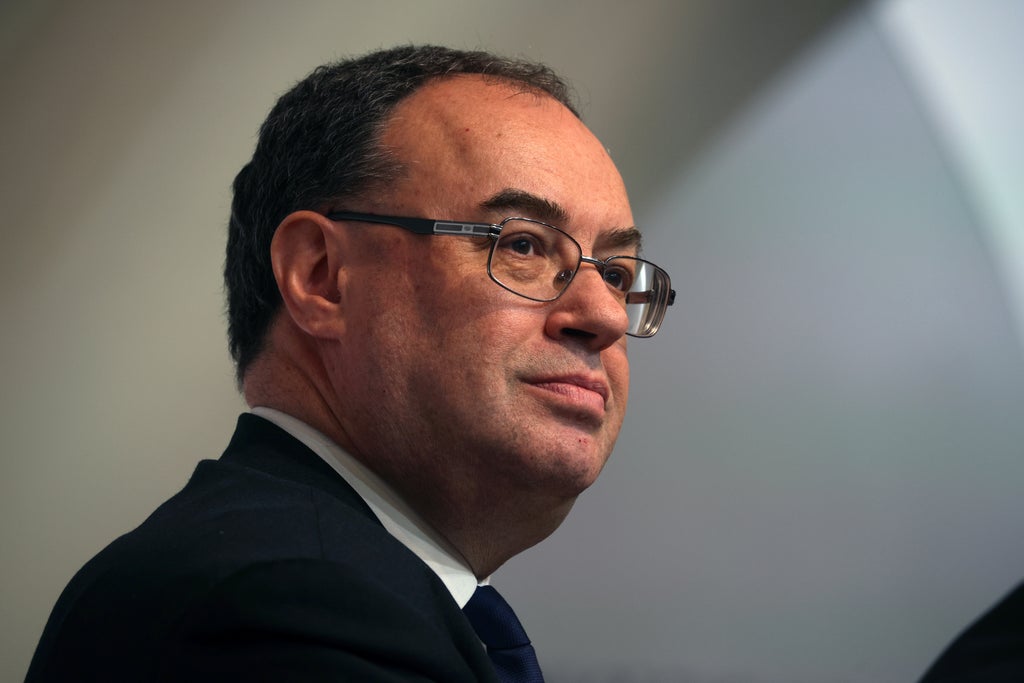
Britain faces the “major concern” of “apocalyptic” global food-price rises sparked by Russia’s invasion of Ukraine, the Bank of England’s governor has told MPs.
Andrew Bailey warned of a “very big income shock” to households, and admitted feeling “helpless” in the face of surging inflation.
His comments came as veteran Tory MP Michael Fabricant called on the chancellor, Rishi Sunak, to raise benefits in line with inflation, and as concerns were raised over plans by the energy regulator to revise the price cap on bills every three months instead of every six.
Mr Bailey defended the Bank’s monetary policy and said there could be a further rise in food costs if Ukraine, a major exporter of agricultural products, is unable to ship wheat and cooking oil from its warehouses because of a Russian blockade.
“Sorry for being apocalyptic for a moment, but that’s a major concern,” Mr Bailey said on Monday, noting that wheat prices alone had risen by just under 25 per cent in the past six weeks.
Britain is already in a “bad situation” with inflation, Mr Bailey said. The cost of living has been driven up by a host of global factors, which could not have been foreseen by rate setters at the bank, he insisted.
These include the war in Ukraine and the latest response by China’s government to a wave of Covid infections in the country, which has included stringent, economically damaging lockdowns. The result has been a sharp and sudden uptick in energy global prices, forcing up the cost of living in the UK.
“I do not feel at all happy about this; this is a bad situation to be in,” Mr Bailey said, noting that inflation is expected to top 10 per cent later this year.
He was responding to questions from Treasury select committee chair Mel Stride MP on whether he had been “asleep at the wheel” when it came to rising interest-rate pressures.
About 80 per cent of the forces pushing up inflation in the UK are being driven by global circumstances, Mr Bailey said. “There’s not a lot we can do about 80 per cent of it,” he added. “We have to recognise the reality of the situation we face.”
Another factor, included in the remaining 20 per cent of issues affecting price growth, was the reduction in the workforce post-pandemic.
“The scale and persistence of the fall has been very unusual,” Mr Bailey said, adding: “These are very fine, and pretty hard, judgements to make, I have to say.”
Inflation – the rate of price growth in the economy – currently stands at 7 per cent, and the Bank of England predicts it could reach 10 per cent this year. This compares with the Bank’s 2 per cent target, which is central to a key part of its mandate, often referred to as “price stability”.
One senior minister said of the Bank: “It has one job to do – to keep inflation at around 2 per cent – and it’s hard to remember the last time it achieved its target.”
A second added that senior figures were “now questioning [the Bank’s] independence”, suggesting that some may see a case for greater political influence over the Bank, which was made independent by Gordon Brown in a move announced immediately after he became chancellor in 1997.
Still, as signs emerge of weakening consumer confidence, the Bank may have to juggle the need to curb inflation with the need to avoid a recession. This is because higher interest rates can often act as a handbrake on economic growth.
The Bank warned earlier this month that the severe squeeze on households’ living standards was likely to trigger a sharp economic slowdown.
Ahead of Monday’s evidence session, Ed Smith, co-chief investment officer at Rathbone Investment Management, said the outlook for a recession in the UK was worse than that in other major economies. As a result, the Bank may be more likely than its international counterparts, including the US Federal Reserve, to “stop tightening sooner than investors expect”.
“Changes in government spending and taxation are a bigger headwind in the UK than in the US. Meanwhile, the cost of living squeeze appears more intense in the UK, and British households didn’t accumulate savings to the same extent during the acute phase of the pandemic,” he said.
“Consumer confidence in the UK has also plunged recently, and there have been some worrying signs of weakness in consumer-related data, like retail sales and new car registrations,” Mr Smith added.







